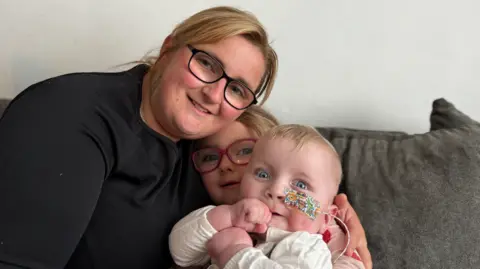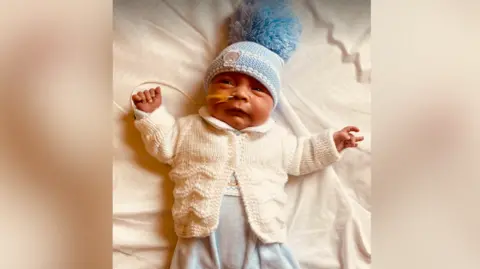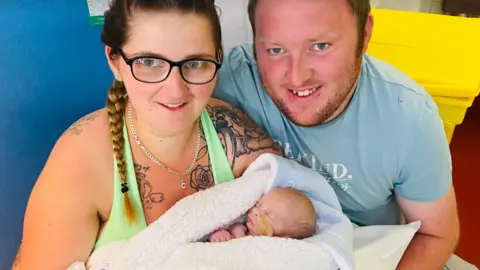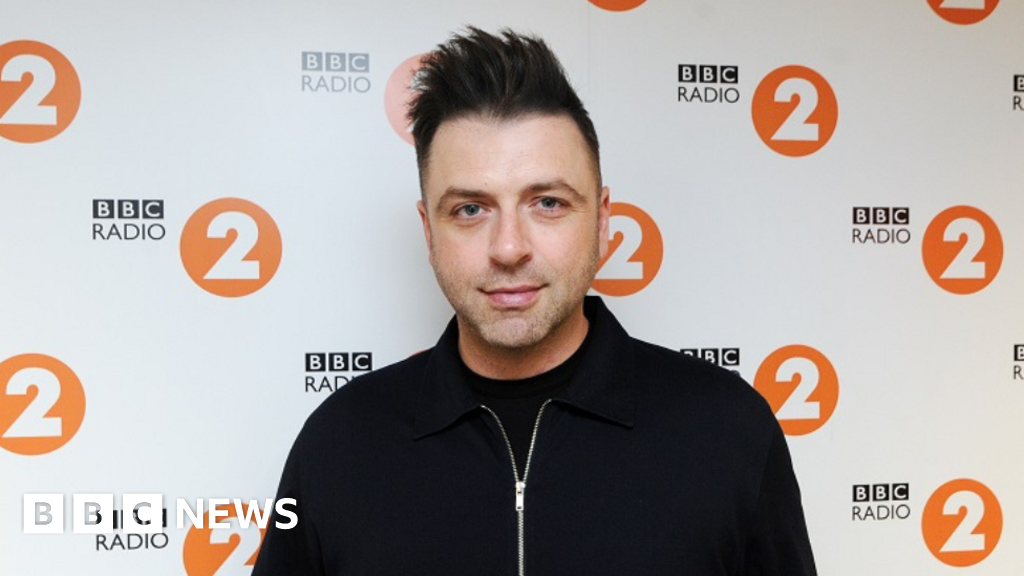3 hours ago
By Jim Scott, BBC News, North East and Cumbria

 BBC
BBC
Chemie-Leigh Lewis says Grayson is generally a "happy" child
The mother of the "only person in the UK" living with the rare and fatal condition Arts Syndrome said she had to fight for "life-changing" medication for her baby son.
Chemie-Leigh Lewis, from Houghton-le-Spring on the edge of Sunderland, said it had been a "hell of a year" after being told one-year-old Grayson may not live beyond the age of six.
Ms Lewis, also mother to Hugo, two, and Gracie-Leigh, five, said the diagnosis followed the loss of her son Hunter, who died at sixteen weeks from sudden infant death syndrome in June 2020.
Offered hope in the form of a treatment to reduce little Grayson's symptoms, the family then had to battle again when an NHS organisation turned down a bid for funding.
"The struggle has been very long and it has seemed like we never get a break," Ms Lewis, who has stopped working as a paid carer to look after Grayson full-time, told the BBC.
'Even a few years'
Fewer than 50 cases of the disease - which can cause hearing and sight loss along with repeated infections - have been reported in the world, according to the charity Metabolic Support UK.
Grayson, who is fed through a tube and was repeatedly hospitalised with infections, was diagnosed weeks after his mum noticed his eyes were unable to focus.
Sunderland Royal Hospital medics suggested using a mix of remedies which included S-adenosylmethionine, but is not officially recognised by the NHS as a treatment for Arts Syndrome.
Ms Lewis said: "We were not sure how long it would give him, but without it he would die before six years old.
"Anything – even if it’s a few years – that’s a lot to us.
"For a mother that has already buried one child, that's everything.”

 Family handout
Family handout
Grayson is blind and will soon have a cochlear implant to help aid his hearing
She said the treatment had already reduced Grayson's infections and the need for him to go to hospital.
However, in April, South Tyneside and Sunderland NHS Trust stopped providing the drug after its request for funding from the body responsible for budgets, the North East and North Cumbria Integrated Care Board, was unsuccessful.
"We weren’t willing to give up hope on him because that’s our little boy," Ms Lewis said.
"We weren’t going to sit back and let it happen... there's nothing we wouldn’t do for any of our kids."
She launched a campaign on social media to try and raise awareness of the situation, but said it had “taken its toll” on her mental health.

 Family handout
Family handout
Grayson's mother hopes the medication will prolong his life
The trust has since agreed to fund the medication itself, but Ms Lewis claimed there is not enough support for parents whose children who have rare conditions.
"When Grayson was diagnosed, no information was given... there should be leaflets and they should be able to support parents.”
After leaving hospital, she claimed she had to research the condition herself and it was only through this she found out “he had a life-limiting condition”.
She said the NHS across the country should recognise the medication for the disease, in case future instances arise.
"It's been a constant fight," she added.
What is Arts Syndrome?
- It is an "ultra-rare" condition that affects how the body stores and uses energy, says Metabolic Support UK.
- It can be inherited by both males and females, but effects can be more serious in males, who may not survive past childhood.
- Arts syndrome is diagnosed through genetic testing if a health professional believes the condition is present, or it runs in the family.
'Huge unmet' needs
Metabolic Support UK chief executive Kirsty Hoyle told the BBC that Grayson is the only patient with the disease the charity "has come across" and is believed to be the only known case in the UK.
She said only a small number of all rare diseases have a specific treatment and there were "huge unmet" needs across patient groups.
"Grayson really evidences how often parents and families need to fill that gap in care and advocate for access to treatment," Ms Hoyle added.
South Tyneside and Sunderland NHS Foundation Trust said it has "current plans to ensure this treatment is in place as we continue to care for Grayson and support his family".
A spokesperson said "discussions with them" had continued throughout as "we [and the family] work together on this".
They added talks were "ongoing with the wider NHS" about how this treatment could be offered to others.
Meanwhile, the NHS North East and North Cumbria Integrated Care Board said it was "pleased that this issue has been resolved".

 1 week ago
4
1 week ago
4








 English (US) ·
English (US) ·